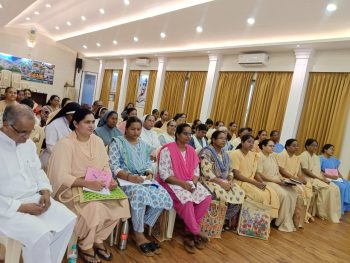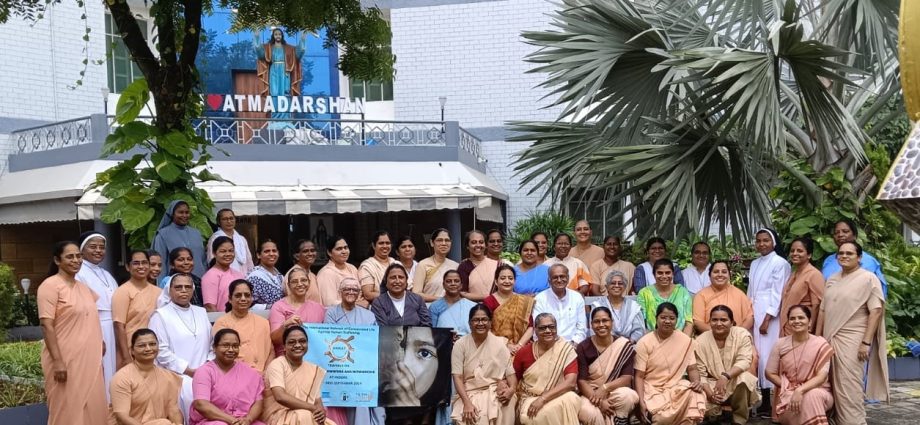By Jacob Peenikaparambil
Indore, Sept 28, 2024: As many as 45 nuns from 32 congregations engaged in anti-human trafficking efforts participated in a workshop aimed at strengthening their leadership, team-building, and networking skills.
The September 24-26 workshop at Prerana Sadan in Indore, Madhya Pradesh, focused on raising the awareness of leadership challenges in the current socio-political context.
It introduced participants to the qualities and skills needed for visionary leadership and familiarize them with team-building processes and conflict resolution within teams.
It also tried to develop and nurture public relations skills among the participants.
 Sister Therese Meera, a member of the Congregation of Our Lady of Charity of the Good Shepherd and president of the Talitha Kum Network in India, organized the program in collaboration with Indore’s Universal Solidarity Movement team.
Sister Therese Meera, a member of the Congregation of Our Lady of Charity of the Good Shepherd and president of the Talitha Kum Network in India, organized the program in collaboration with Indore’s Universal Solidarity Movement team.
The participants represented states such as Bihar, Delhi, Goa, Gujarat, Maharashtra, and Odisha.
The program included movie screenings accompanied by insightful commentaries and group discussions to draw lessons on leadership qualities, team-building, and teamwork.
Other items included input sessions on relevant topics and group activities.
The participants agreed that a leader should have a clear vision and they remain focused on goals and accept and understand team members.
Leaders should own their mistakes and not blame others. They should never stop learning, but continue it through reading and other ways.
Another realization was that essential leadership skills include communication, motivation, and public relations.
A leader should empower others after they empower themselves.
Leaders must identify stakeholders, assess their interests and influence, and develop strategies to gain their support.
In the current Indian context, leaders should respect all religions and focus on spirituality rather than religiosity.
The participants resolved to develop a broad, inclusive, and long-term vision for their life and mission and build and maintain public relations using stakeholder analysis.
They also stressed the need to improve communication skills and delegate authority within teams.
They want to network with like-minded organizations and respect diversity, especially religious diversity.
They also resolved to become spiritual rather than merely religious.












“As many as 45 nuns from 32 congregations engaged in anti-human trafficking efforts participated in a workshop aimed at strengthening their leadership, team-building, and networking skills.”
I request the 45 nuns from 32 congregations to read the Old Testament of the Bible and understand the basic principles of economics before engaging in anti-human trafficking.
Moses was a great Economist. The ancient Israelites followed the Jubilee land laws as laid out by Moses. Because these laws the Israelites were the most prosperous people of their time enjoying freedom and justice.
Virtually unknown in the modern world, and ignored by churches and Christians, this unique and potent collection of economic rules is well laid out in scripture. The cornerstone of the jubilee is found in Leviticus 25.
Nuns of different congregations involving themselves in anti-human trafficking initiatives is appreciated. The nuns of these congregations must be sincere enough to introspect on young girls belonging to Jharkhand, Chhattisgargh, MP, Odisha and Northeastern states are brought to southern states like AP, Telangana, Karnataka, Kerala and Tamil Nadu and are made to work in convents, catholic schools and hospitals as maid-servants. A vast majority of these girls are vulnerable and due to poverty they “agree” to come down to south and work.
What are these nuns as well as CRI, CBCI/CCBI doing to prevent such distress migrations? Poverty, unemployment and lack of job opportunities force these girls to move out of their villages. This problem is not addressed sufficiently.